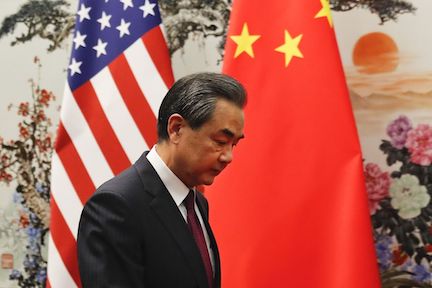China moves forward with law aimed at countering US sanctions
Chinese lawmakers are making progress on legislation to retaliate for foreign sanctions amid a growing rivalry with the U.S.
A National People’s Congress committee filed the second draft of legislation aimed at countering sanctions imposed by foreign governments, the official Xinhua News Agency reported late Monday. Xinhua didn’t give details, but said the legislation would provide legal backing for countering “discriminatory measures by a foreign country in accordance with the law.”

The move shows China is following through with a March vow to expand its legal toolkit as it battles the U.S. on a range of fronts, from allegations of human-rights abuses in the western Xinjiang region to limitations on the types of technology China can import.
The Trump administration sanctioned at least 45 Chinese officials over their role in Beijing tightening its grip on Hong Kong and in setting policies for Xinjiang, including 15 members of the NPC. The Chinese government hit back with sanctions of its own, including punishments aimed at Senators Marco Rubio of Florida and Ted Cruz of Texas, but those lacked bite given the dollar’s dominance in international finance.
That spurred China’s ruling Communist Party to seek other ways to get even with foreign governments and firms for what it sees as interference in domestic matters. In January, the Ministry of Commerce issued rules that would allow China’s courts to punish global companies for complying with foreign sanctions, although the ministry provided few details.
“This is about reducing U.S. hegemonic thinking and actions,” Mei Xinyu, part of a research group under the Ministry of Commerce in Beijing, said of the proposed law. “It is also a warning for countries that follow the U.S. in encroaching on China’s rights and a reminder that there is a price to pay for unjustifiable actions toward China.”
Hong Kong Chief Executive Carrie Lam, who was sanctioned by the U.S. alongside other local officials for helping curtail the city’s freedoms, voiced support for the Chinese legislation on Tuesday. “We welcome and support the country’s move to oppose sanctions from foreign governments,” she said in a regular weekly briefing.
Lam previously said foreign sanctions led to difficulty using her credit cards and left her with “piles of cash” at home because she was no longer able to have a bank account.
Chinese Foreign Minister Wang Yi used an address in March to warn U.S. President Joe Biden not to meddle in China’s affairs, and called on the U.S. to end penalties on Chinese firms.
The NPC’s 175-member standing committee is meeting until Thursday in Beijing. The Global Times said it expects the draft law to be put up for a vote soon.
Similar Stories

U.S. international trade in goods and services, November 2024
View Article
Mexico announces increased tariffs on apparel imports, forcing a “scramble” to reshore operations in the United States
View ArticleCPA applauds Biden Administration action to block Nippon Steel’s purchase of U.S. Steel
The Coalition for a Prosperous America (CPA) commends President Biden’s decisive action to block Nippon Steel’s $14.9 billion bid to acquire U.S. Steel. This decision reflects a necessary commitment to…
View Article
Avocados will continue strong surge in 2025 and beyond
View Article
Forecast 2025: A welcome economic rebound
View ArticleU.S. International Investment Position, 3rd Quarter 2024
The U.S. net international investment position, the difference between U.S. residents’ foreign financial assets and liabilities, was –$23.60 trillion at the end of the third quarter of 2024, according to…
View ArticleGet the most up-to-date trending news!
SubscribeIndustry updates and weekly newsletter direct to your inbox!





